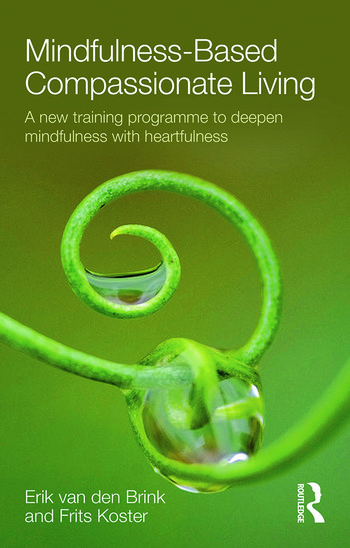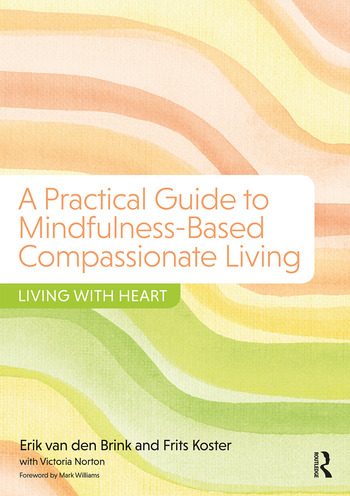What is MBCL?
MBCL is a mindfulness-based compassion training in the form of an 8-week course that supports the development and training of (self-) compsssion to enhance physical, emotional and relational health and well-being. It is suitable as a follow-on course after having followed a basic mindfulness course such as MBSR, MBCT or equivalent.
MBCL helps participants do develop a kind and compassionate attitude toward themselves and others. Special MBCL exercises help participants to experience key aspects of emotional well-being, such as safeness, acceptance and connectedness with themselves and others.
Developed by Erik van den Brink and Frits Koster, MBCL is grounded in science and in the decades- long experience of its two founders. Erik van den Brink brings to MBCL his experience as a psychiatrist and psychotherapist, expert on mindfulness in mental health settings and long-time meditator. Frits Koster integrates his work as a Vipassana teacher, a trainer in MBSR & MBCT, his expertise in Buddhist psychology and his work as a mindfulness trainer for mental health professionals.
MBCL incorporates scientific insights, exercises and teachings gleaned from other compassion training methods as well as contemplatice practices. Developing MBCL the Dutch founders were e.g. inspired by the work of Christopher Germer, Kristin Neff and Paul Gilbert (the pioneers of Western compassionpractice and its application in health care), neuroscientist and mindfulness teacher Rick Hanson, the work of the American psychologist and researcher Dr. Barbara Fredrickson and the work of the psychologist and meditation teacher Tara Brach.
MBCL was originally developed in the ambulant mental health setting for clients who benefited from MBSR/MBCT and needed more support, particularly those with tendencies to be harsh with themselves, finding it difficult to receive kindness.
MBCL is not aimed at specific diagnostic groups but - like MBSR - is adressing unhealthy reactions and patterns contributing to suffering in general. So, clients vulnerable to depression, anxiety, burnout, chronic pain or fatigue, and various emotional and relational difficulties can all benefit.
It soon turned out that the MBCL programme is also very helpful for
health care professionals and other professionals working with people
(e.g. in education, as a coach or in management), being vulnerable to
symptoms of burnout.
In recent years, MBCL has rapidly expanded beyond the mental health sector and is found to be helpful for anyone, professionals and non- professionals, having to live in a frantic world and wishing to deepen mindfulness with ‘heartfulness’.
What is compassion?
Compassion is a human quality that enables us to be sensitive towards our own and others‘ pain and suffering. It is accompanied by the willingness and the courage to relieve and prevent this suffering and do something about it.
Compassion has a transpersonal quality, for it involges the willingness to alleviate and prevent suffering - regardless of who the (potential) sufferer is. So when we speak of "compassion", we bear in mind, that it does not exclude anyone. It includes "self-compassion" as well as compassion for all our fellow beings, for nature and for our planet earth.
Compassion is not about being overinvolved with others at the expense of ourselves. Neither about wallowing in self-pity whilst neglecting others. It is about finding a way to care for ourselves and for others in a balanced way.
Compassion is a human capacity, present in all of us, which did not always have the chance to blossom. Fortunately, the ability to respond compassionately to pain and suffering in ourselves and others can grow with practice, which is precisely what the Mindfulness-Based Compassionate Living (MBCL) programme wishes to offer.
Research
There is an increasing amount of research showing the beneficial effects of compassion-based interventions for our physical, emotional and relational health.
The MBCL programme itself has shown beneficial effects in a growing number of studies – in clinical and non-clinical settings, on location and online, in controlled and uncontrolled, quantitative and qualitative research.
Three Randomized Controlled Trials (RCT´s) have now been published, studying:
- MBCL after MBCT among people with recurrent depression (Schullling et al., 2020).
- An MBCL online programme among people with high levels of self-criticism (Krieger et al., 2019).
- A brief online intervention with MBCL exercises among students (Ondrejková. et al., 2020)
In summary, research upt to date (2023) konfirms that after an MBCL intervention:
- mindfulness, self-compassion, quality of.life and resilience increase;
- depression, self-criticism, anxiety and stress levels decrease.
Recognized as a Mindfulness-Based Programme (MBP)
MBCL is acknowledged by the British Association of Mindfulness-Based Approaches (BAMBA), the Dutch Vereniging Mindfulness-Based Trainers Nederland (VMBN) and the EAMBA European Associations for Mindfulness, as a ‘normal dose follow-up’ Mindfulness-Based Programme (MBP) – for those who have followed a foundational MBP such as MBSR and MBCT before.
MBCL Course Description
The MBCL course is a mindfulness-based 8-week program that helps participants develop and train compassion for themselves and others.
MBCL exercises help participants to experience feelings of warmth, safety, acceptance and connection with themselves and others. Moreover, the MBCL course teaches helpful theory behind the compassion training and shows ways in which you can take the quality of compassion into your everyday life. Another important focus is how to compassionately deal with difficult feelings and challenging life situations.
The MBCL program is recommended as a continuation or deepening course for all those, who have already participated in an MBSR/MBCT or Breathworks course or have sufficient experience in mindfulness practice. It can be particularly supportive for people living with depression, anxiety, illness, chronic pain and traumatic experience. It consists of 8 weekly units of 2.5 - 3 hours each and a half or full silent practice day.
In the following publications you can find detailed information about the MBCL program:

Erik van den Brink & Frits Koster (2015):
„Mindfulness-Based Compassionate Living. A new training programme to deepen mindfulness with heartfulness.“
This book contains a detailed description of the MBCL course, the different exercises, theoretical background and an overview of the state of research in the field of compassion training.

Erik van den Brink, Frits Koster & Victoria Norton (2018):
„A Practical Guide to Mindfulness-Based Compassionate Living – Living with heart.“
This book is an accompanying handbook for participants. It explores the science of compassion in a comprehensive manner appealing to anyone, who wishes to deepen their mindfulness practice with ´heartfulness´.